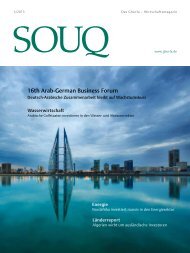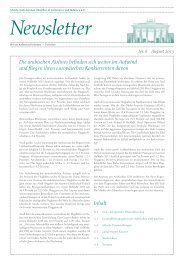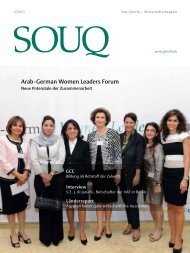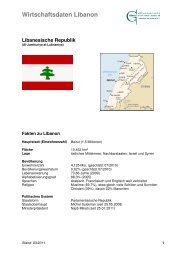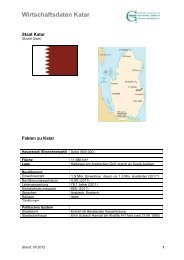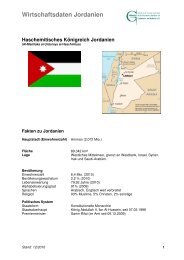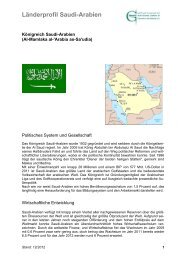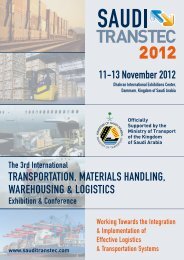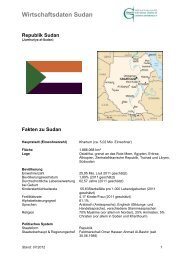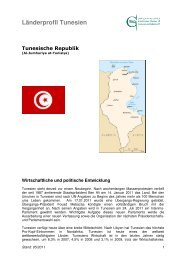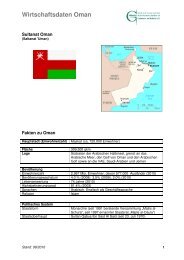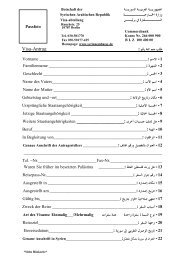Saudi-Arabien Wirtschaftshandbuch Saudi Arabia Business ... - Ghorfa
Saudi-Arabien Wirtschaftshandbuch Saudi Arabia Business ... - Ghorfa
Saudi-Arabien Wirtschaftshandbuch Saudi Arabia Business ... - Ghorfa
Erfolgreiche ePaper selbst erstellen
Machen Sie aus Ihren PDF Publikationen ein blätterbares Flipbook mit unserer einzigartigen Google optimierten e-Paper Software.
118<br />
ment are recorded in the commercial register. In addition,<br />
the General Meeting can appoint a Board of Supervision.<br />
The registered capital for limited companies completely<br />
owned by <strong>Saudi</strong>s is defined by the partners in the<br />
company articles. In the case of limited companies that<br />
also have some foreign capital, the registered capital is<br />
at least 500,000 SR, insofar as the limited company does<br />
not require more registered capital due to a higher investment<br />
volume and/or the purpose of the company.<br />
A core area of the contractual regulations are the articles<br />
of association that are registered in the company register<br />
at the Ministry of Trade and Industry. The content of<br />
the articles and numerous formulations are stipulated in<br />
laws and/or by requirements set by the <strong>Saudi</strong> Ministry<br />
of Trade and Industry. For this reason it is common that<br />
partners also conclude a further company agreement,<br />
namely the Shareholders Agreement, in order to be able<br />
to define further more detailed regulations. Some explosive<br />
issues here relate to the general management, the<br />
transfer of partner shares and the design of the mandatory<br />
prescribed sales law. One important economic issue<br />
is the obligatory regulation that states that 10% of the<br />
recorded profit needs to be put back every year until a reserve<br />
of 50% of the registered capital has been achieved.<br />
The registered capital itself can be provided as money,<br />
payable during the foundation process into a foundation<br />
account of the company in <strong>Saudi</strong> <strong>Arabia</strong>, also, it may<br />
be provided as assets in kind. In this case, there must be<br />
contractual agreement about the valuation of the assets<br />
in kind, if necessary in correspondence with a valuation<br />
performed by an auditing office licensed to operate in<br />
<strong>Saudi</strong> <strong>Arabia</strong>. It is common for the <strong>Saudi</strong> partner to provide<br />
the buildings and machines.<br />
After the limited company has been registered at the<br />
Ministry of Trade and the commercial registration has<br />
been issued, the company legally exists. In this connection,<br />
membership of the responsible Chambers of Industry<br />
and Commerce must be applied for. After this, the<br />
company can register with the customs authorities, the<br />
tax office, the labour office and the immigration office.<br />
the dependent branch office<br />
The dependent branch office is a type of presence that<br />
compensates the lack of a second partner as required for<br />
the limited company. However, the branch office is dependent,<br />
i.e. it does not have its own legal entity and is<br />
therefore directly connected to the foreign parent company.<br />
In contrast to the limited company, it has no own<br />
registered capital, but it does have a minimum amount<br />
of capital as demanded by the SAGIA licence now and<br />
again. This needs to be paid into a bank account before<br />
the foundation phase has been completed. This capital<br />
is not tied down here, but is freely available to the<br />
branch office after the formal foundation process has<br />
been completed.<br />
The branch office has no limitation of liability. Whilst<br />
it may not have the suitable legal form for local production<br />
or the provision of services, in some cases this form is<br />
appropriate for realising government orders or privately<br />
commissioned projects. This is especially the case if the<br />
contracting authority or company is looking for a direct<br />
legal relationship to a foreign company. A limited company<br />
based on <strong>Saudi</strong> law cannot do this as it has its own<br />
legal entity and cannot be owned to 100% by a foreign<br />
company due to the need for a second partner.<br />
Foreign banks can select to choose the branch office as<br />
the legal form instead of the limited company or public<br />
company if they receive a bank licence from the <strong>Saudi</strong><br />
central bank which is always possible now that the <strong>Saudi</strong><br />
bank sector has been opened. The German Bank received<br />
a licence for a branch office in April 2004 and BNP Paribas<br />
in October 2005. Operative banks set up operations<br />
as public companies. The same now applies for foreign<br />
insurance companies. Here the insurance control law and<br />
its introduction regulations state that insurers may only<br />
set up operations in the country as public companies. In<br />
this connection, a minimum requirement of freely tradable<br />
shares of up to 40% is defined. As an alternative, the<br />
branch office legal form was also introduced for foreign<br />
insurers in April 2005 (Royal Decree No. 3120/MB<br />
dated 13.4.2005); however the financial requirements<br />
are similar to the public companies of the insurers and<br />
reinsurers, i.e. 100 million SR for insurers and 200 million<br />
SR for reinsurers.<br />
the professional partnership<br />
The professional partnership is the legal form for freelance<br />
professions such as engineers, lawyers, auditors, tax advisors<br />
and doctors. These professions may open up practices<br />
or offices together with <strong>Saudi</strong> colleagues or theoretically<br />
on their own, after authorization has been obtained by<br />
the authorities responsible for the respective profession.<br />
The creation of these kinds of professional partnerships<br />
have been blocked by now due to tax reasons. In practice,<br />
this legal form is replaced by cooperation agreements on<br />
the basis of which personnel is sent from abroad to <strong>Saudi</strong><br />
<strong>Arabia</strong> to the local partner.



